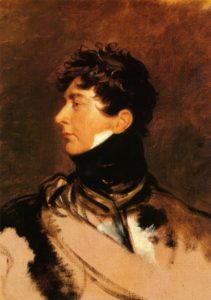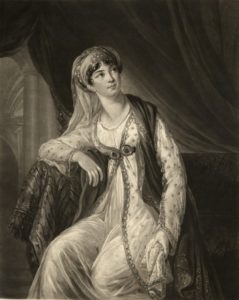
The Prince Regent by Lawrence
“Darcy! Oh, Darcy!” shrieked Lydia to his back, as he made his way out of the box. “Don’t go! Wickham has left his box and I swear he is coming around here. He really is! I hope he gets here before the plaguey curtain goes up again. Oh, has he got a woman with him? Tell the Countess to just give me those glasses back again, would you, Byron.”
“Let us have a look,” said Byron coolly, and took a long inspection. “Why, yes. It is La Grassini. I am not surprised, I had heard he was back with her again.”
“That’s the fat woman who won him away from me with her ruby parure, is it not?” Lydia asked, rather mortified. “The one from the masked ball.”
“Yes, that’s Guisippina. It is well known that your husband is her cavalier servente,” he told her. “She is very wealthy and he is lucky that she seems to fancy him most tenaciously. I do not know that you shall be able to get him away from her.”
“Yet he is coming here,” Elizabeth observed. “That might be a hopeful sign.”
“Take back an unfaithful husband!” Lydia fumed. “Not in a pig’s eye.”
“If he is so corrupted as that,” Mr. Collins said gravely, “I do not think it will be desirable to have Mr. Wickham settled back in the family after all.”
Wickham appeared in the box, as handsome and as blandly engaging as ever, no more embarrassed than if he had merely stepped out for a short promenade. Beside him, the stout, middle-aged coloratura, in a most flamboyant opera gown of flame-colored silk that clung to her embonpoint, held his arm and gazed upon him with possessive pride.

La Grassini
“Lord Byron! You here!” said Wickham with such forthright animation that Elizabeth was reminded, not for the first time, of how his manners made him seem all he should be, but was not.
“Yes, how d’ye do, Wickham. Allow me to present the Contessa Guiccioli, of whom you may have heard.”
He bowed low. “Indeed, Signora, all Venezia has been agog at the happy news of your marriage. You and your sposo reside in Ravenna, do you not?”
The girl brightened up at the word she understood, and tapped Mr. Wickham with her fan. “Si, viviano a Ravenna, ma il mio sposo non e qui. La mia compagna e con mi…”
Mr. Collins looked blank, and Lord Byron kindly interpreted. “She says her husband is not here, he has gone back to Ravenna, and left her with a lady companion to enjoy herself.”
The clergyman looked around. “But I do not see any such lady,” he said baffled.
“Ah, she has given her confidante some time to herself. Fanny Silvestrini, she is called, her governess, and also conveniently the inamorata of the Count’s steward. But you do not need all these details. Suffice to know that Fanny is aware she is safe with me tonight.”
Wickham looked at Byron with admiration. “How you do know how to manage things,” he said.
“It is the Italian way,” Byron assured him. “All is very well understood, in the world of the cavalier servente. And I am fast becoming one to my Teresina. Is she not worth it? Fair as sunrise, warm as noon, this girl, a peach only just broken.”
“How I envy you, Byron. And you have influenced me more than you know. I have learned something of your reputation and ways, and I am not ashamed to say that I should like to adopt a profession such as yours.”
“You mean to start writing poetry?” asked Elizabeth innocently.
“Poetry! I hope not that,” snorted Byron. “No, poetry is the end of all things. It was of my marriage, certainly. Only three weeks in, my wife asked me “When, my lord, do you intend to give up versifying?’ That finished us. I could not recommend such a course to you, Wickham.”
“Of course not. I did not mean poetry, as you know perfectly well.”
“You are more cut out for a ladies’ man, I collect.”
“He thinks he is,” Lydia said, with a toss of the head.
“Oh, there you are, Lydia. Yes, I do think, upon the whole, that I am very well suited to the requirements for the profession of cavalier servente. A serving cavalier, or gallant, to a married woman, you know. Do not you agree with me, Lord Byron?”
Byron shrugged. “I would not discourage you from the attempt. There are worse ways of life.”
“If Lydia becomes an opera singer, and Wickham a…is there a word for it in English, Darcy?” Elizabeth asked. “What a pair they shall turn out.”
“I do not think such a term exists in English.,” Darcy replied. “Certainly not one that can be said in polite company. But it must be as old a profession for a man as for a woman.”
“That is enough, Darcy, how can you talk of such things! And you, Elizabeth, to be so indelicate. Mr. Collins, you ought to put a stop to this at once, as a minister, and as cousin to this poor woman. For what will happen to Lydia if Mr. Wickham makes such a wicked choice?”
“She can go back to England,” Wickham said easily, “with you. I thought that was what she meant to do. Are you not, Lydia? It will sit very well with me. I know I shall be happier amidst the fleshpots of Italy, do you not think I shall, Lord Byron?”
“You do seem peculiarly fitted for such a life,” shrugged Byron. “Better than I am, for I am torn with misdoubts that I ought to be spending my time better, in my work, or in doing some political good in the world. But you can have nothing better to aim for.”
“I should say he can!” fumed Lady Catherine. “And if Mr. Collins will not tell you, I will. It is Mr. Wickham’s bounden duty to return to his wife and escort her back to England, where such things could never happen!”
“Lady Catherine is right,” Mr. Collins put in feebly.
“Well, I do not rule it out entirely,” said Wickham calmly. “If you will make an offer, tell me what situation might be mine if I consent if I should agree to return to England, it might be possible.”
“I am not going to give you any more money, Wickham,” Darcy said shortly. “Only passage home, in a carriage with the servants.”
“I was not addressing you, Darcy. It is Lady Catherine who has the patronage at court, I believe. Do you not, your ladyship? I would give ear to any proposal if you thought you could procure for me a decent situation about the court.”
“Decent!” snorted Darcy.
“Hush, my dear, do not spoil it.”
Lady Catherine was momentarily taken aback by the young man’s effrontery, but said slowly, “It is true, I do have friends at Court. Lady Hertford has long been my great friend – you have heard me speak of her, Mr. Collins. The Marchioness of Hereford. I have visited her very many times at Manchester House.”
“Who is she, Lizzy?” hissed Lydia.
“The Prince’s mistress, I believe,” she answered succinctly.
“Nonsense! I will not admit any such calumny,” said Lady Catherine with heat. “She is only the Prince’s very great friend, and a most elegant lady. She has influenced the Prince much in his Tory politics, and he often consults her as to his households, for you must know, he has several, with a vast staff in each.”
“I would not mind being at Carlton House, and living the London life,” mused Wickham.
“Perhaps. But I think, last I heard, they were looking for soldierly types to man the Brighton Pavilion.”
Lydia clapped her hands together. “Brighton! We might go back to Brighton again, do you hear that Wickham? I can think of nothing I should like so much! We must. Do say you will! I have been happier in Brighton than any other time in my life. Would we have a suite of rooms at the Pavilion, or a house a little way off, do you suppose!”
A flicker of interest crossed Wickham’s face. “It would be good to lead a bit of the military life again,” he admitted.
“There, you see, Lady Catherine? Wickham is willing! Cannot you arrange it?”
“It might do very well, Aunt,” said Darcy after a moment’s prudent thought. “Wickham would have full activity and Lydia a home.”
“And what a home,” murmured Elizabeth, somewhat scandalized.
La Grassini removed her hand from Wickham’s arm. “If that is your intention, I will be off,” she said indifferently.
“My dear Guissippina…I did not mean…”
“Oh never mind. There is many a pretty young man in Venezia, you are not so speciale as you believe.”
“Yes, I think it might be the best solution for all,” Lady Catherine nodded. “I will write to Lady Hertford at once. I am sure Wickham would be just what they want. So you say yes, do you, young man?”
“I will consider it,” Wickham answered.

3 comments
Oh is Wickham going to even like the reality of being at Court? Haha!
Consider it? He well might as he appears to have just lost his meal ticket in Italy! Although I do wonder how he will feel living full time with Lydia AND their children?😲😲 I suppose he might force himself to seek other enjoyments?🤔😉 . But at least they will be away from Darcy and Elizabeth (and her wardrobe!👗👗)
I can only hope that Elizabeth and Darcy may soon be spared the company of all their ridiculous family and acquaintances in Venice! While it’s very amusing for us, as readers, to laugh at Wickham, Byron, and Lydia, it can’t be as amusing for them (though they’re being very patient about it)! Oh, and I appreciated Darcy’s comment hinting that men have been prostituting themselves as long as women have! Thanks, Diana.